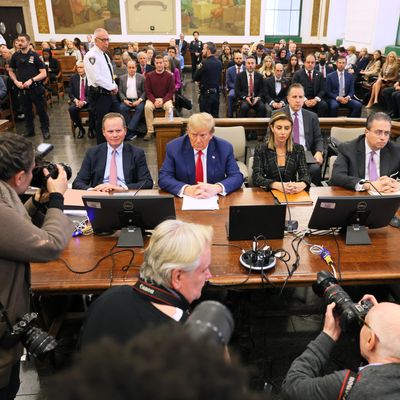

Photo: Michael M. Santiago/Getty Images
In a court filing on Monday, Donald Trump’s attorneys admitted something that must hurt their billionaire client preoccupied with the appearance of wealth: He has not been able to find anyone to give him a bond worth the $464 million that he was ordered to pay after losing New York’s civil fraud case against him. He needs that bond to stop the attorney general from seizing his assets as he appeals the massive judgment against him.
Trump’s “ongoing diligent efforts have proven that a bond in the judgment’s full amount is ‘a practical impossibility,’” his attorneys wrote in a nearly 5,000-page filing. He has not been able to find any financial institution, even after an appellate judge made it easier for him to go to banks in the state to seek out the enormous sum. According to his legal team, their “diligent efforts have included approaching about 30 surety companies through four separate brokers.”
So far, the bondsmen have been tough negotiators. Trump’s lawyers say that insurance companies and other institutions have refused to “accept hard assets such as real estate as collateral” and will “only accept cash or cash equivalents (such as marketable securities).” This isn’t great news for Trump, who is known to be asset rich and relatively cash poor, as far as billionaires go. Trump’s attorneys also said he would need to hand over 120 percent of the penalty, a total of around $557 million.
So what happens next? As legal bills mount and the presidential campaign picks up, Trump’s attorneys are asking the panel of appeals-court judges for a stay, which would block Attorney General Letitia James’s office from seizing his assets during the appeal process. (His team has also argued that the size of such a bond is “rarely, if ever, seen.”) It is also still possible that James could extend the bond deadline. But if Trump’s lawyers are unsuccessful and he does not post bond by next Monday, James could begin the process of seizing his assets. “We are prepared to make sure that the judgment is paid to New Yorkers,” she said in February, after a judge ruled that the Trump Organization had committed business fraud for years. “I look at 40 Wall Street each and every day.” She was referring to the Trump building less than two blocks from her office in the Financial District.

 Latest Breaking News Online News Portal
Latest Breaking News Online News Portal




